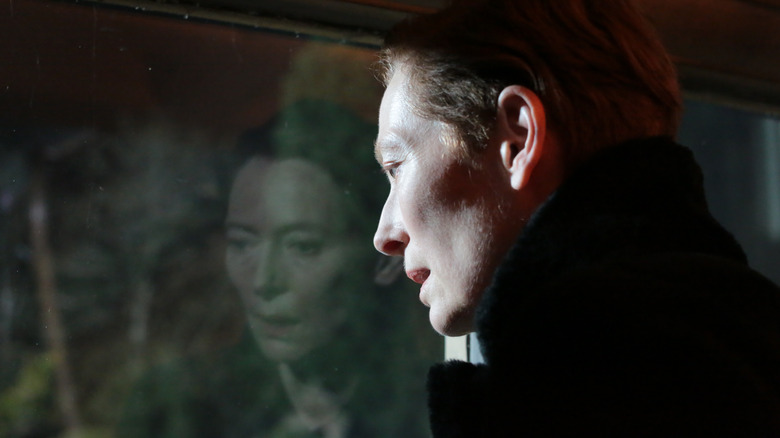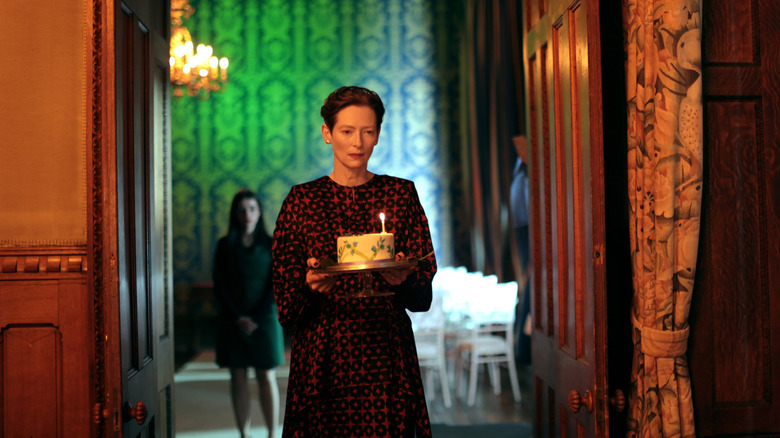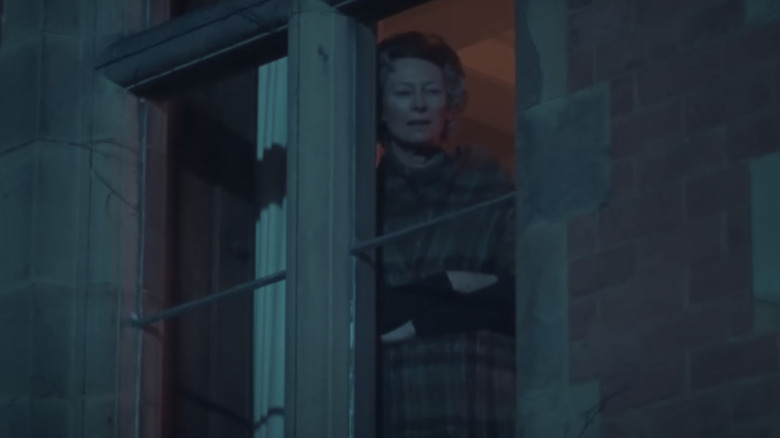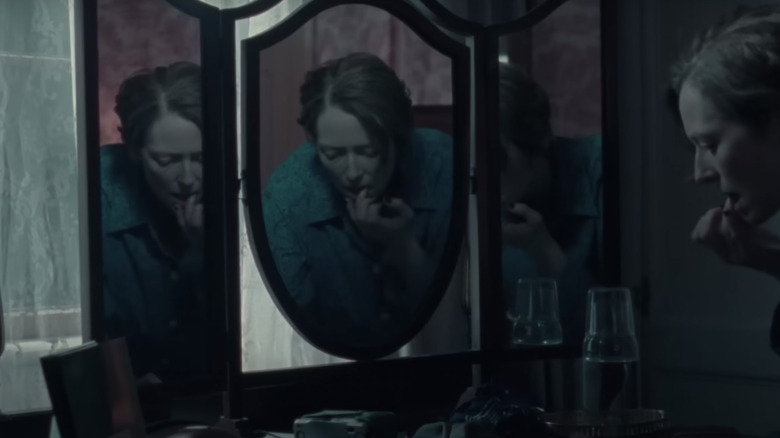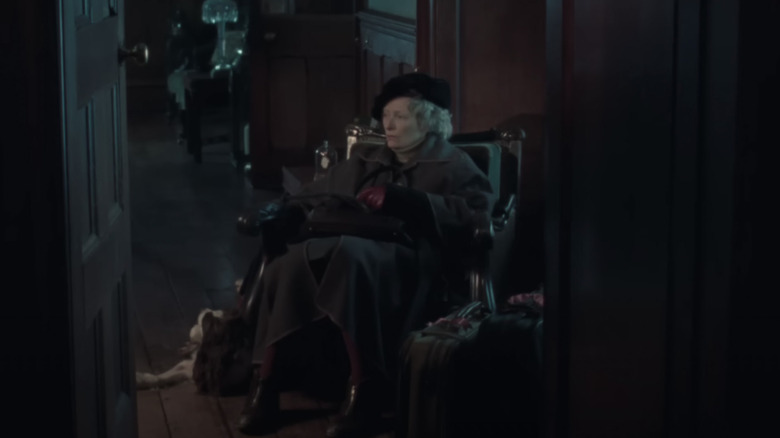Joanna Hogg On How Scorsese, Kipling, And Her Mother Influenced The Eternal Daughter [Exclusive Interview]
Joanna Hogg received critical acclaim for her last two movies, the deeply personal "The Souvenir" and "The Souvenir Part II," which presented a fictionalized version of her experience during film school in the '80s. In those films, Honor Swinton Byrne played Julie, a fictionalized version of Hogg, while Byrne's real-life mother, Tilda Swinton, played Julie's mother, Rosalind.
"The Eternal Daughter" revisits Julie and Rosalind in our present day, with Swinton now playing both an older Julie and a more elderly Rosalind. The tone of "The Eternal Daughter," however, is markedly different than that of the two "Souvenir" films. Hogg's latest work is a gothic ghost story, set in an eerie old manor that has been converted into a hotel.
"All my films have been about places and the ghosts within them and the memories within them," Hogg told me in an interview about the making of her latest film. "I'm absolutely fascinated in that. And so of course, when I'm actually doing a ghost story, that was going to come to the fore."
During the course of our conversation, Hogg shared how "The Eternal Daughter" didn't start out as a ghost story, how Martin Scorsese gave her the inspiration to make it one, how the place where she shoots greatly informs her work, and more. Read on for the whole spoiler-free discussion.
This interview has been lightly edited for clarity and brevity.
'It was the first time I'd read a ghost story that moved me to tears'
I wanted to talk a little bit about how you decided after "The Souvenir Part II" that this was the next film that you wanted to tackle. Could you share your process for deciding what to work on next?
I've actually been hanging around that story for a while. I'd written it after I made "Unrelated," my first feature film, and I was going to make it before "Archipelago" [which came out in 2010] — it was a bit different, the story then. It was still about a middle-aged daughter and an elderly mother going to stay in an empty hotel. But I hadn't gone into the genre space at that point.
I ended up not being able to make it then, because my mother was very much alive and well, and I just felt in the end, too guilty to create this work because I thought, "Well, I'll never be able to show it to her. She'll never be able to see it, and I won't be able to tell her what I'm doing." And it was just too fraught with too many anxieties around my mother. So I made "Archipelago" instead.
With "Archipelago," I ended up creating this family that wasn't directly personal, but of course is in many ways. So I just decided to move away from the personal for a little bit with that film. And before I made "The Souvenirs" ["The Souvenir" and "The Souvenir Part II"], I thought, "Well, am I going to do these two films that go back to my film school days? Or am I going to make a ghost story?" Because I'd become increasingly interested in ghost stories and been reading a lot and watching quite a lot. And in the end, I decided to make "The Souvenirs."
Then after "The Souvenirs," with the creation of Rosalind, who was created by Tilda [Swinton] so wonderfully, that character of the mother who grew up in the Second World War was so interesting. So I brought out "The Eternal Daughter" again — it was a 30-page document, more like a short story. I showed it to Tilda and then started talking to her about this story. At that point the characters weren't called Julie and Rosalind. I'm not even sure if I had names. And then in talking to Tilda one day in a phone conversation — this is during lockdown in 2020 — she said, "Oh, maybe I should play both parts." Because I was thinking that she's going to be Julie and we'll find an elderly actress to play Rosalind. And it went up that she would play both.
You mentioned you had the script for "The Eternal Daughter" for a while, but that it didn't have that ghost story element. When exactly did you add that ghost story element into the story?
After making "The Souvenirs." I mean, actually, if I think about it, there was an overlap with all of those films because I was promoting "The Souvenir Part II" while preparing the shoot for "The Eternal Daughter." So somehow, in a way, thanks to the first lockdown we had in this country, there was a bit of time and space. We were all at home, weren't we? And actually not a lot of emails were coming in and we weren't going out. No distractions, basically.
I was thinking a lot about ghosts at that time, because of many people losing family and friends, and a real theme of loss coming about it. And anxiety — I felt anxiety, and I know a lot of people did. We didn't really know what we were dealing with. And then I was worried for my mother, who was quite elderly at that point. So ghosts came very naturally out of that.
But then I was also talking to Martin Scorsese, who's been an incredible influence and inspiration with my filmmaking and become a friend. He's very interested in ghost stories and ghost films, and he recommended to me some short stories to read. One was a book of short stories by Rudyard Kipling. And one of the stories that actually became the most influential to the film was "They," and it's a beautiful story that's very personal to Kipling, apparently. It was the first time I'd read a ghost story that moved me to tears. And that combination of ghosts and something very emotional and personal really rang, and really changed something in my approach to "The Eternal Daughter."
'Wherever I'm filming, I wait for the place to tell me what to do'
"The Eternal Daughter" is a ghost story, of course, but no ghost story is just a ghost story. One of the things I was really struck by was the film's focus on memories and how memories are real, and how places can hold memories when you visit them. When you were crafting the script, especially when you were incorporating these ghost story elements, was that a jumping off point for you? Just using the physical space of that old manor as a place that holds memories?
Yes. And like you've just described, I'm so interested in places and the ghosts in places and what history that place has. All my films have been about places and the ghosts within them and the memories within them. I'm absolutely fascinated in that. And so of course, when I'm actually doing a ghost story, that was going to come to the fore. Even talking about it with you now, I realize it's not a conscious thing, but I just have a fascination for places. I find even if I stay one night in a hotel room, I become very attached to that space, very interested in it. I think, "Well, who else has been in this room? What's happened in this room?" Sometimes one picks up on something a bit dark and disturbing in a space.
So it was really then about finding a house that could contain all that — that would get my imagination going. Because wherever I film, I have to have a close relationship with it. It's usually the absolute starting point for the stories, the place. And I can never call the places where I film "locations," because that just feels too impersonal and distant.
The way of that we found Soughton Hall in Wales [the manor where "The Eternal Daughter" was filmed] was actually by Googling, because it was March/April 2020. I'm Googling, "Haunted houses around the U.K.," and looking at different architecture and looking at houses that hadn't been used in other films because I wanted to find something that really didn't have other associations with it at all.
Then I found this wonderful house that has an incredible history. One of the architects was Charles Berry, who was the architect of the Houses of Parliament in London. And then the owner of the house had been traveling all over the world, so there's Islamic influences, Italianate influences. It's a very rich combination of different architecture. And so finally we were able to go and visit there — I couldn't decide on it until actually going to see it — and it's a wedding venue now. No weddings were obviously happening at that point in time, so it was available for us. I visited with Stéphane Collonge, my production designer who has designed all my films, and we both walked around and fell in love with it. Bit spooked by it, but fell in love with it.
Was it all shot in that Hall? Did you do any set builds?
No. Stéphane built some elements within the house, but it all took place there. Some of us lived in the house during the shooting, including myself.
I was going to ask that, as it can certainly get you in the mood for the film by staying there.
Exactly.
And the Hall is a character almost in itself. It's a cliche to say that, but it's true. One thing that really struck me was the shots of long hallways and at night, the eerie green lighting. It almost seems like a labyrinth in some ways that holds good memories and bad. How did you approach crafting those shots?
Wherever I'm filming, I wait for the place to tell me what to do. And that place begged views down corridors. I always like to establish a geography that's very true to the place. So I don't make the kitchen in a different place to where it really is. The carved door from the entrance hall and sitting room into the reception area, that carved door was there already and it's really quite frightening.
But then Stéphane built the architecture that's behind the reception desk, where the keys live. It is his architecture, but he based it on the exterior of the house itself. And he built this incredible wooden house for the keys. But it fits so well. And in fact, apparently the hotel has now become a hotel again and they've kept that there because it just fit so well behind the desk.
There were many other things that Stéphane did. And then there was that marquee outside, well, we were both a bit horrified by the marquee, rather like the reaction Julie has when she arrives. We didn't particularly want it to be there, but then realized actually, of course it has to be there because they're coming to stay in this hotel that's changed. It's no longer the home that Rosalind knew as a child. And so it needed to have some elements that she would hate.
And then the green lights are exit lights at the hotel and are all over because it's used as a wedding venue and a hotel, so they've got to have all these security doors and lights. And that maybe struck us some, the ghostliness of those green lights. And of course, Ed Rutherford, our director of photography, exaggerates that green. We just pushed everything a bit further.
Even the room names we didn't change. And there was a room called Rosebud, which looks like I'm making a reference to "Citizen Kane," but it was already there.
That's really interesting how you take the place like that and work it into the final film. Were there any major changes you made to the story once you were there and saw the space and just saw what you had?
I mean, I'm sure there are, and the thing is — I'm not writing. There's no script. So it's like a short story, what we are working from. All the dialogue comes about while we're there. So Tilda in her two guises is coming up with those words, as is Carly [Sophia-Davies], who plays the receptionist, and then Joseph Mydell, who plays Bill — it's all created at the time and it's all utilizing what's there in many ways.
And it reminds me talking about it, that it's what Stéphane and I have done with all the films — with "Unrelated," that was set in one house, and we used what was there. I mean, that was partly a budgetary thing because we couldn't afford to build sets or change too much. But it actually became the aesthetic and became a key part of how we make films.
'It wasn't always that we wanted to see the mirror itself, but to get a feeling of disorientation'
Another thing I noticed in the film is the use of mirrors, especially with Julie's character, but also with Rosalind. I would love to hear how you decided to incorporate that from a creative standpoint but also from a technical standpoint. I imagine that must have been tricky to shoot.
Yes. But also, because of the doubling, you had to be careful what you saw. And sometimes we would create a shadow of, well — more of Julie than Rosalind, but sometimes the other way around — and create a shadow of something moving across to give a sense of the other person being there.
But in terms of the mirrors, that was always really interesting. I love mirrors, and it's always exciting to see a different perspective. And there are some scenes where it's not immediately obvious that we're shooting through a mirror, but one can maybe look at it closely and see that the image is flipped. I'd say it wasn't always that we wanted to see the mirror itself, but to get a feeling of disorientation.
Something that really captures the mood and the tone of the film is the sound — the wind blowing, and the noises at night that Julie hears. How did you go about deciding what noises you wanted where, and how did you capture them?
I'm so glad you've asked about the sound, actually, because [sound designer] Jovan Ajder is another collaborator of mine that I've worked with now for nearly 20 years. He's done the sound design for all the films, and it's one of my favorite parts of the filmmaking, the sound. He absolutely dove deeply into this story and became like a method sound designer, if there's such a thing. I mean, he lived and breathed it, and the wind sounds are so delicately orchestrated with the music. We took this one piece of Bartók music for strings and percussion. Another movement of that piece Kubrick used in "The Shining." And of course, we didn't want to tread on that with all the associations it has, so it's another movement.
And Jovan did miracles with it where it gets repeated, but it gets repeated with different instrumentation. The flute is so connected with the wind, so the way the wind sounds merge into the flute sounds and then the voices — he used the voice of Carly Sophia-Davis, who plays the receptionist, as she's also a singer as well as an actor. And she was singing the Bartók, which is incredibly challenging to do in very subtle ways. You might not know it's a voice, but sometimes there's a voice there where you think it's the wind. There were so many other sounds — it took months and months to orchestrate all the sounds together.
The flute I thought was especially poignant. I don't want to get too spoilery, but after Bill talks about a flute in a certain way, it was certainly moving.
Yeah, that was a wonderful thing that Joseph himself brought to the character, because we'd already thought about the flute and the close relation between the flute and the wind. It was an amazing thing that it turns out that Joseph had been learning the flute. So then of course, that gets incorporated, and it was a very moving — I feel he's very moving, Joseph, in the way that he portrays Bill. He's putting a lot of himself in there, but also this idea of the loss that he's dealing with in his own life.
'If I go to genre, it'll have some connection with my life in some way'
Absolutely. And "The Eternal Daughter" is obviously different, in terms of tone, than "The Souvenirs" and has more of a gothic feel. Do you think that's something you want to explore again, perhaps with your next project?
Yeah, I'm still figuring it out, to be honest, but I'm still interested in ghosts. So I haven't finished with them. I have the beginnings of some ideas of what to do, but I'm also really fascinated by genre, so I might go deeper into that. But at the same time, I can't get away from the personal, whatever I'm dealing with at particular points in time when I'm creating a story; generally there's merging of me and the thing I'm trying to create. I don't think I can escape that. I go rather deep. If I go to genre, it'll have some connection with my life in some way.
When you say genre, obviously there's science fiction, fantasy, surrealism. Is there any particular type of genre you're especially interested in?
Maybe farther into ghosts and even horror. I hesitate to say that because I'm really in such early days, and I don't even know if that would be the next film that I do. But yeah, I like to be scared and I'm also easily terrified.
You mentioned science fiction as well, and I feel that there could be some connection with science fiction, too. But again, it would be in my own way. So I feel the problem with saying I'm doing a particular genre is then there's immediately an expectation and then there are rules. There's a sort of game I feel you have to play to an extent, but I guess I'm never interested in playing the obvious game.
That's interesting. And science fiction can be many things — it doesn't have to have space lasers to be science fiction.
Exactly. And it's also about fear of the future.
"The Eternal Daughter" is in theaters now.
